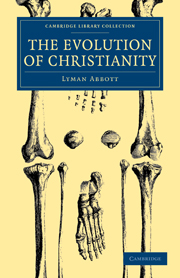Book contents
- Frontmatter
- Preface
- Contents
- CHAPTER I EVOLUTION AND RELIGION
- CHAPTER II THE EVOLUTION OF THE BIBLE
- CHAPTER III THE EVOLUTION OF THEOLOGY: THE OLD THEOLOGY
- CHAPTER IV THE EVOLUTION OF THEOLOGY: THE NEW THEOLOGY
- CHAPTER V THE EVOLUTION OF THE CHURCH
- CHAPTER VI THE EVOLUTION OF CHRISTIAN SOCIETY
- CHAPTER VII THE EVOLUTION OF THE SOUL
- CHAPTER VIII THE SECRET OF SPIRITUAL EVOLUTION
- CHAPTER IX CONCLUSION: THE CONSUMMATION OF SPIRITUAL EVOLUTION
CHAPTER VII - THE EVOLUTION OF THE SOUL
Published online by Cambridge University Press: 29 August 2010
- Frontmatter
- Preface
- Contents
- CHAPTER I EVOLUTION AND RELIGION
- CHAPTER II THE EVOLUTION OF THE BIBLE
- CHAPTER III THE EVOLUTION OF THEOLOGY: THE OLD THEOLOGY
- CHAPTER IV THE EVOLUTION OF THEOLOGY: THE NEW THEOLOGY
- CHAPTER V THE EVOLUTION OF THE CHURCH
- CHAPTER VI THE EVOLUTION OF CHRISTIAN SOCIETY
- CHAPTER VII THE EVOLUTION OF THE SOUL
- CHAPTER VIII THE SECRET OF SPIRITUAL EVOLUTION
- CHAPTER IX CONCLUSION: THE CONSUMMATION OF SPIRITUAL EVOLUTION
Summary
How does man come to a divine manhood? Is the process of redemption consistent with the doctrine of evolution? Can the doctrine of redemption be stated in the terms of an evolutionary philosophy? Christlieb has said that the whole Christian creed can be stated in two words, sin and salvation. Are these two articles of our common Christian faith consistent with the doctrine that all life, spiritual as well as physical, proceeds by a “continuous progressive change, according to certain laws, and by means of resident forces”? If not, Christian faith and evolutionary philosophy are inconsistent, and we must conclude either that evolutionary philosophy is false; that Christian faith is false; or that spiritual life is not subject to the law of all other forms of life. For any belief which eliminates these two articles, sin and salvation, from the Christian creed destroys it altogether. It may leave us theists, but not Christians.
The evolutionary philosophy is certainly not consistent with the popular statement of either sin or salvation. That statement is briefly this: God made man perfect. By an act of voluntary disobedience man fell. As a result of that fall, all his descendants became either depraved, i. e., inherently inclined to sin (the New School theory), or sinful, i. e., inherently guilty before God and deserving of his condemnation, independent of any voluntary conscious act committed by the individual (the Old School theory).
- Type
- Chapter
- Information
- The Evolution of Christianity , pp. 203 - 228Publisher: Cambridge University PressPrint publication year: 2009First published in: 1892



